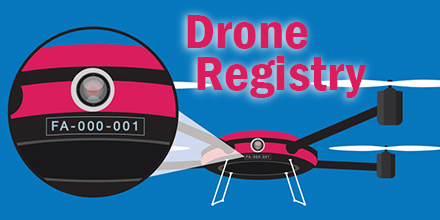FAA Drone Registry Breaks 1 Million
 Recently, U.S. Department of Transportation Secretary, Elaine L. Chao, announced that the total number of drones registered with the Federal Aviation Administration (FAA) eclipsed one million.
Recently, U.S. Department of Transportation Secretary, Elaine L. Chao, announced that the total number of drones registered with the Federal Aviation Administration (FAA) eclipsed one million.
Chao made the announcement at the annual Consumer Electronics Show (CES) in Las Vegas, NV.
The 1 million registrants include 878,000 hobbyists and 122,000 commercial users. Hobbyists receive one identification number for all the drones they own. Commercial, public and other drones are individually registered.
“The tremendous growth in drone registration reflects the fact that they are more than tools for commerce and trade. Drones can save lives, detect hazardous situations and assist with disaster recovery,” said Chao. “The challenge is to remove unnecessary hurdles to enable the safe testing and integration of this technology into our country’s airspace.”
FAA drone registry
Once again, drone registration with the FAA is mandatory for hobbyist and recreational operators.
On Dec. 12, President Donald Trump signed the 2018 National Defense Authorization Act, which applies primarily to defense funding. However, it also included a measure reinstating the requirement for hobbyists to register drones with the FAA.
Last May, a federal judge ruled that the agency exceeded its authority to regulate hobbyist and recreational drones, a category Congress specifically excluded.
Currently, the FAA requires registration for drones weighing between .55 and 55 pounds for both commercial and recreational use.
Hobbyists and other users whose drones meet these requirements can register using the FAA’s web-based registry system. Registration costs $5 and is valid for three years. Some unmanned aircraft must still be registered using the agency’s paper-based traditional aircraft registration system.
Those who fail to register can face civil and criminal penalties, according to the agency.
Education, an added benefit
Additionally, the registration process helps educate drone operators who may be entirely new to aviation. As drone registrants go through the process they also learn about and agree to the FAA’s operating rules. Plus, registration helps increase airspace security by identifying drones with their owner.
The agency also uses the registration database to push important safety messages to drone users.

